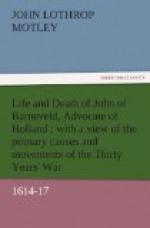Alas! it was easy for his Majesty to take to heart the matter of Conrad Vorstius, to spend reams of diplomatic correspondence, to dictate whole volumes for orations brimming over with theological wrath, for the edification of the States-General, against that doctor of divinity. But what were the special interests of his son-in-law, what the danger to all the other Protestant electors and kings, princes and republics, what the imperilled condition of the United Provinces, and, by necessary consequence, the storm gathering over his own throne, what the whole fate of Protestantism, from Friesland to Hungary, threatened by the insatiable, all-devouring might of the double house of Austria, the ancient church, and the Papistical League, what were hundred thousands of men marching towards Bohemia, the Netherlands, and the duchies, with the drum beating for mercenary recruits in half the villages of Spain, Italy, and Catholic Germany, compared with the danger to Christendom from an Arminian clergyman being appointed to the theological professorship at Leyden?
The world was in a blaze, kings and princes were arming, and all the time that the monarch of the powerful, adventurous, and heroic people of Great Britain could spare from slobbering over his minions, and wasting the treasures of the realm to supply their insatiate greed, was devoted to polemical divinity, in which he displayed his learning, indeed, but changed his positions and contradicted himself day by day. The magnitude of this wonderful sovereign’s littleness oppresses the imagination.
Moreover, should he listen to the adjurations of the States and his fellow religionists, should he allow himself to be impressed by the eloquence of Barneveld and take a manly and royal decision in the great emergency, it would be indispensable for him to come before that odious body, the Parliament of Great Britain, and ask for money. It would be perhaps necessary for him to take them into his confidence, to degrade himself by speaking to them of the national affairs. They might not be satisfied with the honour of voting the supplies at his demand, but were capable of asking questions as to their appropriation. On the whole it was more king-like and statesman-like to remain quiet, and give advice. Of that, although always a spendthrift, he had an inexhaustible supply.




